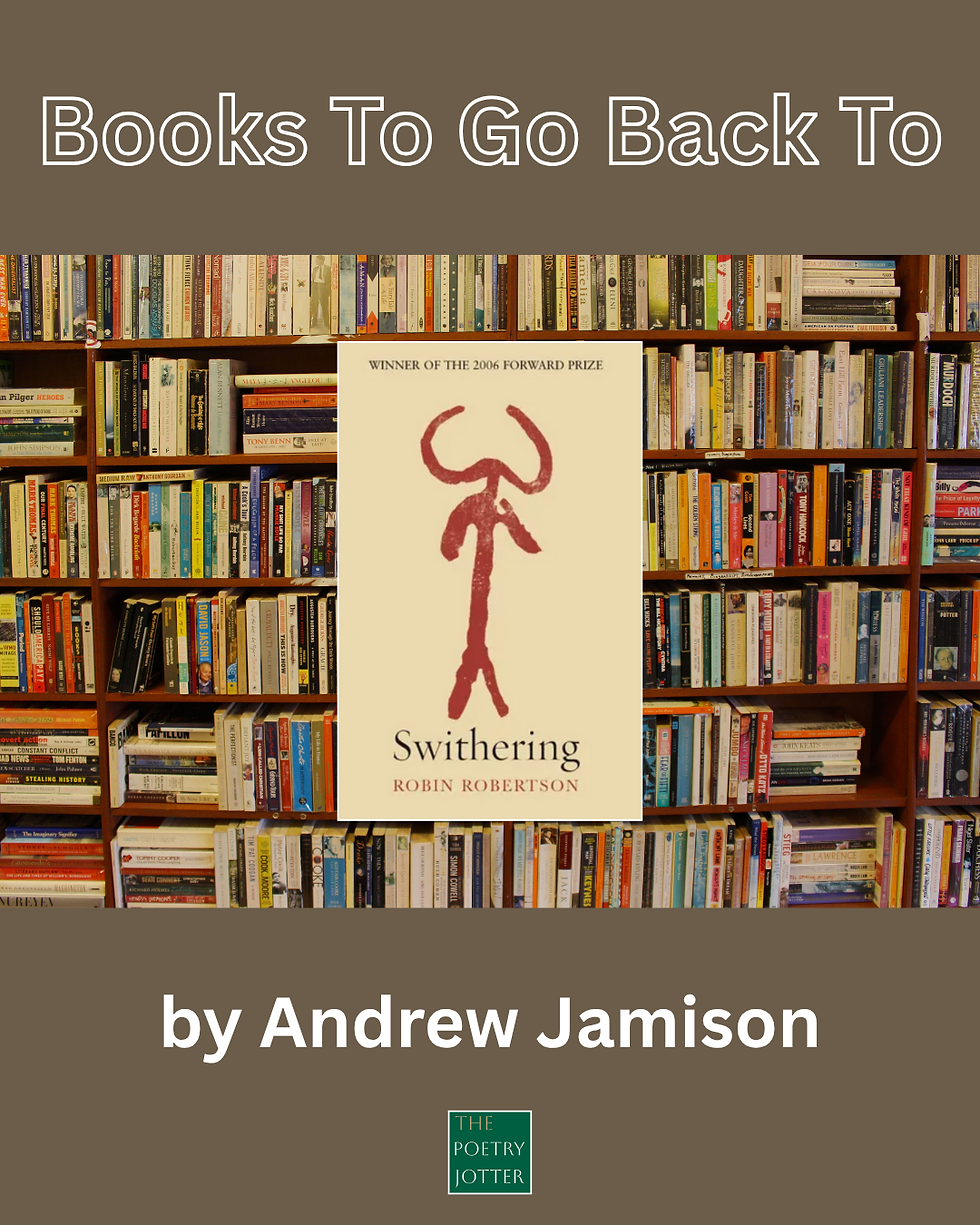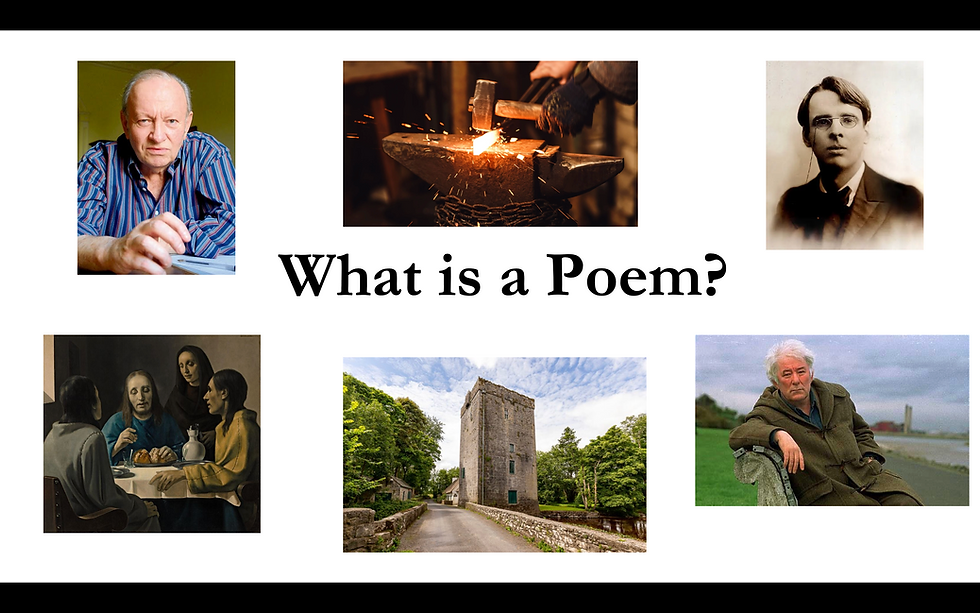Books To Go Back To: Robin Robertson’s ‘Swithering’ (Picador, 2006)
- Andrew Jamison
- Jun 22, 2025
- 4 min read
Updated: Aug 16, 2025

2006 doesn’t seem that long ago to me, but then again I also happen to feel like the 1990s only happened yesterday. At any rate, Robin Robertson’s Swithering was published when I was studying in London in 2006, and, as it was nominated for the T. S. Eliot Prize that year, I was able to hear him read from it at the Bloomsbury Theatre (this was the venue of the prize readings before it moved to the Southbank Centre). I remember his reading very well indeed, and his distinctive, serious, almost growly Scottish accent bringing a new dimension to the poems. The collection didn’t win that year, it was Paul Muldoon’s Horse Latitudes which picked up the gong, however more recently I’ve been taking down Swithering and reading it again, and finding more and more to it. I should mention Robertson’s book did win the Forward Prize that year.
Looking back at the T. S. Eliot Prize shortlist for that year, and indeed that decade, a part of me wonders if it was a vintage time for poetry, with other poets on the list in 2006 such as Paul Farley, Simon Armitage, Penelope Shuttle and more. However, as I’ve been re-reading Swithering I’ve been thinking about why this is a collection which not only stands the test of time but actually seems to be better than I remember it. So, I thought I’d try to categorise what it is that makes this such an outstanding collection.
Lyricism
The musicality of Robertson’s lines, by which I mean the rhythm and balance of sounds is excellent. Take for example a couple of lines from’ Asparagus’ where he writes ‘In a slather and slide, butter/ floods at the bulb head.’ In ‘La Stanza Delle Mosche’ ‘The room sizzles in the morning sun;/ a tinnitus of flies at the bright windows…’ In ‘Swimming in the Woods’ he writes ‘Her long body in the spangled shade of the wood/ was a swimmer moving through a pool…’ There’s a real sense of sensuality and luxuriance to these lines, which is counterweighed with more direct address as in ‘Drowning in Co. Down’ which opens with ‘This place can’t hold enough rain.’ This sense of ease in shifting, or indeed swithering, between long and short lines, direct and more elaborate modes of address give the book such a range of notes and dynamism.
Form and Line Lengths
There is a great variety of line lengths in this collection, and sense of playfulness when it comes to poetic form. While the voice of the poems is assured, Robertson doesn’t just repeat his favourite forms again and again. In fact, I found it so refreshing to see Robertson rarely use iambic pentameter and was impressed by his handle on a range of line lengths. It seems that for this collection he has favoured in general a rather short line, however, as opposed to making the lines stilted and staccato he employs enjambment expertly to keep the sentence moving. For example, here is ‘To My Daughters, Asleep’ in its entirety:
Surrounded by trees I cannot name
that fill with birds I cannot tell apart
I see my children growing away from me;
the hinges of the heart are broken.
Is it too late to start, too late to learn
all the words for love before they wake?
In many ways, this poem encapsulates everything I love about this collection: tenderness and sincerity expressed with virtuosic control of the line and form of the poem.
Endings
I’m fascinated by how poets end their poems and I’m always looking for new ways of doing this. What I love about this book is that it’s almost a textbook on poetic technique, with each poem an example of something new and a masterclass on an aspect of form, but particularly on how to end a poem. So many of Robertson’s poems end with a surprise, and he seems to revel in surprising the reader. In 'New York Spring' for example he ends with ‘The dance finished/ twenty years ago.’ It’s not just surprise, though, that ends his poems, but at other times a deep sense of pathos and devastating tenderness as in ‘Donegal’ where he watches his daughter go into the sea, but ends the poem watching himself:
I saw a man in the shallows
with his hands full of clothes, full of
all the years,
and his daughter going
where he knew he could not follow.
Imagination
I cannot stress enough the inventiveness of this collection. The book teems with originality and the poet's vision as opening the book at random we're confronted with a new speaker, a new form, a new image, a surprising opening line or situation. In 'Ghost of a Garden' the speaker walks us through a garden and we are confronted at the end, all of a sudden, with their dead father and the helpless speaker who utters the line 'and I cannot help him because he is dead.' This collection shows us the depth a poet’s imagination and the power of the imagination, and how, when rendered with this level of technical proficiency, it can resonate down the years.
Why Go Back to This Book?
Like the very best collections of poetry, it not only achieves a sense of immediacy over the reader, but it has the requisite depth to keep us going back. But more than that, it’s a book which can teach us a lot about form and how to craft a line - to read it is to be given a masterclass in the subtle movements and choices that a poet makes in their lines, and how these small decisions end up as more than the sum of their parts. Swithering is a wonder.















Comments